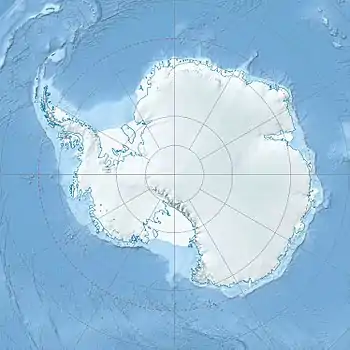Cape Bird (77°10′S 166°41′E / 77.167°S 166.683°E) is a cape which marks the north extremity of Ross Island in Antarctica. It was discovered in 1841 by a British expedition under James Clark Ross, and named by him after Lieutenant Edward J. Bird of the ship HMS Erebus.
Cape Bird Hut
Cape Bird Hut | |
|---|---|
Hut | |
 Cape Bird Hut Location of Cape Bird in Antarctica | |
| Coordinates: 77°13′05″S 166°26′09″E / 77.218088°S 166.435795°E | |
| Country | |
| Location in Antarctica | Beacon Valley Ross Island Antarctica |
| Administered by | Antarctica New Zealand |
| Established | 1966 |
| Population | |
| • Total | 6 |
| Type | Seasonal |
| Status | Operational |
Cape Bird Hut (77°13′05″S 166°26′09″E / 77.218088°S 166.435795°E) is a shelter, built in 1966 with the name of Harrison Laboratory, in order to give a facility to the researchers working at Cape Bird. The hut, which can accommodate six people, was built at Scott Base during the winter and lifted by helicopter to Cape Bird. The shelter was then rebuilt in 1991 nearby the old one designated, in the meantime, as ASPA 116.[1]
See also
References
- ↑ "Cape Bird". Antarctica New Zealand. newzealand.gvt.nz. Archived from the original on May 22, 2010. Retrieved October 4, 2018.
 This article incorporates public domain material from "Cape Bird". Geographic Names Information System. United States Geological Survey.
This article incorporates public domain material from "Cape Bird". Geographic Names Information System. United States Geological Survey.
This article is issued from Wikipedia. The text is licensed under Creative Commons - Attribution - Sharealike. Additional terms may apply for the media files.
.svg.png.webp)